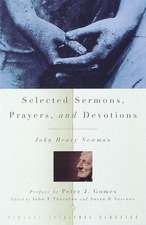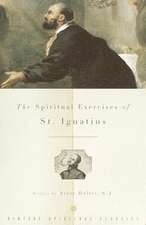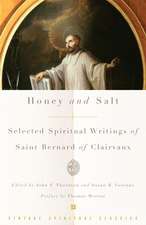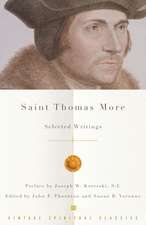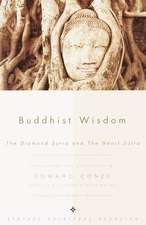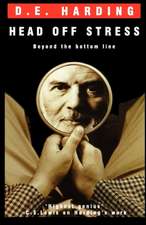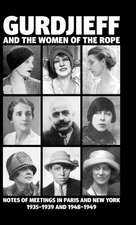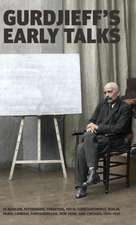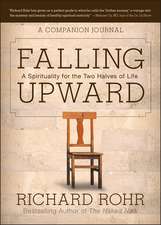Late Have I Loved Thee: Selected Writings of Saint Augustine on Love
James J. O'Donnell Editat de John F. Thornton, Susan B. Varenneen Limba Engleză Paperback – 30 noi 2006
Augustine (354-430 A.D.) was the most prolific writer of Christian antiquity and the most influential theologian in Church history. In his first encyclical, God Is Love, current Pope Benedict XVI acknowledges his indebtedness to him. When we read Augustine today, we encounter the same direct, eloquent passions his original listeners experienced, infused with his deep sense of human weakness and burning desire for union with God.
Preț: 139.05 lei
Nou
Puncte Express: 209
Preț estimativ în valută:
26.62€ • 28.92$ • 22.37£
26.62€ • 28.92$ • 22.37£
Carte tipărită la comandă
Livrare economică 22 aprilie-06 mai
Preluare comenzi: 021 569.72.76
Specificații
ISBN-13: 9780375725692
ISBN-10: 0375725695
Pagini: 413
Dimensiuni: 132 x 203 x 25 mm
Greutate: 0.5 kg
Editura: Vintage Books USA
ISBN-10: 0375725695
Pagini: 413
Dimensiuni: 132 x 203 x 25 mm
Greutate: 0.5 kg
Editura: Vintage Books USA
Notă biografică
Augustine, (354-430) was the bishop of Hippo in North Africa and a Father of the Church. Born to a Christian mother and a pagan father, Augustine underwent a profound conversion experience at the age of 32, renouncing his life of sensuality and wordly ambition. Ordained a priest in 391 and made bishop in 396, Augustine was also a pioneer of monasticism and founded a religious rule that is still widely used by men and women in monastic life.
James O'Donnell is provost at Georgetown University and editor of the definitive edition of Augustine's Confessions. He is the author of Augustine: A New Biography (Ecco, 2005).
James O'Donnell is provost at Georgetown University and editor of the definitive edition of Augustine's Confessions. He is the author of Augustine: A New Biography (Ecco, 2005).
Extras
Book I
1, 1. Great are you, O Lord, and exceedingly worthy of praise; your power is immense and your wisdom beyond reckoning. And so we humans, who are a due part of your creation, long to praise you--we who carry our mortality about with us, carry the evidence of our sin and with it the proof that you thwart the proud. Yet these humans, due part of your creation as they are, still do long to praise you. You arouse us so that praising you may bring us joy, because you have made us and drawn us to yourself, and our heart is unquiet until it rests in you.
Grant me to know and understand, Lord, which comes first: to call upon you or to praise you? To know you or to call upon you? Must we know you before we can call upon you? Anyone who invokes what is still unknown may be making a mistake. Or should you be invoked first, so that we may then come to know you? But how can people call upon someone in whom they do not yet believe? And how can they believe without a preacher? But Scripture tells us that those who seek the Lord will praise him, for as they seek they find him, and on finding him they will praise him. Let me seek you, then, Lord, even while I am calling upon you, and call upon you even as I believe in you; for to us you have indeed been preached. My faith calls upon you, Lord, this faith which is your gift to me, which you have breathed into me through the humanity of your Son and the ministry of your preacher.
5, 5. Who will grant me to find peace in you? Who will grant me this grace, that you would come into my heart and inebriate it, enabling me to forget the evils that beset me and embrace you, my only good? What are you to me? Have mercy on me, so that I may tell. What indeed am I to you, that you should command me to love you, and grow angry with me if I do not, and threaten me with enormous woes? Is not the failure to love you woe enough in itself? Alas for me! Through your own merciful dealings with me, O Lord my God, tell me what you are to me. Say to my soul, "I am your salvation." Say it so that I can hear it. My heart is listening, Lord; open the ears of my heart and say to my soul, "I am your salvation." Let me run toward this voice and seize hold of you. Do not hide your face from me: let me die so that I may see it, for not to see it would be death to me indeed.
6. The house of my soul is too small for you to enter: make it more spacious by your coming. It lies in ruins: rebuild it. Some things are to be found there which will offend your gaze; I confess this to be so and know it well. But who will clean my house? To whom but yourself can I cry, "Cleanse me of my hidden sins, O Lord, and for You know everything, Lord. Have I not laid my own transgressions bare before you to my own condemnation, my God, and have you not forgiven the wickedness of my heart? I do not argue my case against you, for you are truth itself; nor do I wish to deceive myself, lest my iniquity be caught in its own lies. No, I do not argue the case with you, because "if you, Lord, keep the score of our iniquities, then who, Lord, can bear it?"
Book II
1, 1. Now I want to call to mind the foul deeds I committed, those sins of the flesh that corrupted my soul, not in order to love them, but to love you, my God. Out of love for loving you I do this, recalling my most wicked ways and thinking over the past with bitterness so that you may grow ever sweeter to me; for you are a sweetness that deceives not, a sweetness blissful and serene. I will try now to give a coherent account of my disintegrated self, for when I turned away from you, the one God, and pursued a multitude of things, I went to pieces. There was a time in adolescence when I was afire to take my fill of hell. I boldly thrust out rank, luxuriant growth in various furtive love affairs; my beauty wasted away and I rotted in your sight, intent on pleasing myself and winning favor in the eyes of men.
2, 2. What was it that delighted me? Only loving and being loved. But there was no proper restraint, as in the union of mind with mind, where a bright boundary regulates friendship. From the mud of my fleshly desires and my erupting puberty belched out murky clouds that obscured and darkened my heart until I could not distinguish the calm light of love from the fog of lust. The two swirled about together and dragged me, young and weak as I was, over the cliffs of my desires, and engulfed me in a whirlpool of sins. Your anger had grown hot at my doings, yet I did not know. I was deafened by that clanking chain of my mortal state which was the punishment for my soul's pride, and I was wandering away from you, yet you let me go my way. I was flung hither and thither, I poured myself out, frothed and floundered in the tumultuous sea of my fornications; and you were silent. O my joy, how long I took to find you! At that time you kept silence as I continued to wander far from you and sowed more and more sterile seeds to my own grief, abased by my pride and wearied by my restlessness.
5, 10. The beautiful form of material things attracts our eyes, so we are drawn to gold, silver, and the like. We are powerfully influenced by the feel of things agreeable to the touch; and each of our other senses finds some quality that appeals to it individually in the variety of material objects. There is the same appeal in worldly rank, and the possibility it offers of commanding and dominating other people: this too holds its attraction, and often provides an opportunity for settling old scores. We may seek all these things, O Lord, but in seeking them we must not deviate from your law. The life we live here is open to temptation by reason of a certain measure and harmony between its own splendor and all these beautiful things of low degree. Again, the friendship which draws human beings together in a tender bond is sweet to us because out of many minds it forges a unity. Sin gains entrance through these and similar good things when we turn to them with immoderate desire, since they are the lowest kind of goods and we thereby turn away from the better and higher: from you yourself, O Lord our God, and your truth and your law. These lowest goods hold delights for us indeed, but no such delights as does my God, who made all things; for in him the just man finds delight, and for upright souls he himself is joy.
6, 13. For in vice there lurks a counterfeit beauty: pride, for instance--even pride apes sublimity, whereas you are the only God, most high above all things. As for ambition, what does it crave but honors and glory, while you are worthy of honor beyond all others, and eternally glorious? The ferocity of powerful men aims to inspire fear; but who is to be feared except the one God? Can anything be snatched from his power or withdrawn from it--when or where or whither or by whom? Flirtatiousness aims to arouse love by its charming wiles, but nothing can hold more charm than your charity, nor could anything be loved to greater profit than your truth, which outshines all else in its luminous beauty. Curiosity poses as pursuit of knowledge, whereas you know everything to a supreme degree. Even ignorance or stupidity masquerades as simplicity and innocence, but nothing that exists is simpler than yourself; and what could be more innocent than you, who leave the wicked to be hounded by their own sins? Sloth pretends to aspire to rest, but what sure rest is there save the Lord? Lush living likes to be taken for contented abundance, but you are the full and inexhaustible store of a sweetness that never grows stale. Extravagance is a bogus generosity, but you are the infinitely wealthy giver of all good things. Avarice strives to amass possessions, but you own everything. Envy is contentious over rank accorded to another, but what ranks higher than you? Anger seeks revenge, but whoever exacts revenge with greater justice than yourself? Timidity dreads any unforeseen or sudden threat to the things it loves, and takes precautions for their safety; but is anything sudden or unforeseen to you? Who can separate what you love from you? Where is ultimate security to be found, except with you? Sadness pines at the loss of the good things with which greed took its pleasure, because it wants to be like you, from whom nothing can be taken away.
6, 14. A soul that turns away from you therefore lapses into fornication when it seeks apart from you what it can never find in pure and limpid form except by returning to you. All those who wander far away and set themselves up against you are imitating you, but in a perverse way; yet by this very mimicry they proclaim that you are the creator of the whole of nature, and that in consequence there is no place whatever where we can hide from your presence.
With regard to my theft, then: what did I love in it, and in what sense did I imitate my Lord, even if only with vicious perversity? Did the pleasure I sought lie in breaking the law at least in that sneaky way, since I was unable to do so with any show of strength? Was I, in truth, a prisoner, trying to simulate a crippled sort of freedom, attempting a shady parody of omnipotence by getting away with something forbidden? How like that servant of yours who fled from his Lord and hid in the shadows! What rottenness, what a misshapen life! Rather a hideous pit of death! To do what was wrong simply because it was wrong--could I have found pleasure in that?
7, 15. How can I repay the Lord for my ability to recall these things without fear? Let me love you, Lord, and give thanks to you and confess to your name, because you have forgiven my grave sins and wicked deeds. By your sheer grace and mercy you melted my sins away like ice. To your grace also do I ascribe whatever sins I did not commit, for what would I not have been capable of, I who could be enamored even of a wanton crime? I acknowledge that you have forgiven me everything, both the sins I willfully committed by following my own will, and those I avoided through your guidance.
Is there anyone who can take stock of his own weakness and still dare to credit his chastity and innocence to his own efforts? And could such a person think to love you less, on the pretext that he has had smaller need of your mercy, that mercy with which you forgive the sins of those who turn back to you? If there is anyone whom you have called, who by responding to your summons has avoided those sins which he finds me remembering and confessing in my own life as he reads this, let him not mock me; for I have been healed by the same doctor who has granted him the grace not to fall ill, or at least to fall ill less seriously. Let such a person therefore love you just as much, or even more, on seeing that the same physician who rescued me from sinful diseases of such gravity has kept him immune.
Book III
1, 1. So I arrived at Carthage, where the din of scandalous love affairs raged cauldron-like around me. I was not yet in love, but I was enamored with the idea of love, and so deep within me was my need that I hated myself for the sluggishness of my desires. In love with loving, I was casting about for something to love; the security of a way of life free from pitfalls seemed abhorrent to me, because I was inwardly starved of that food which is yourself, O my God. Yet this inner famine created no pangs of hunger in me. I had no desire for the food that does not perish, not because I had my fill of it, but because the more empty I was, the more I turned from it in revulsion. My soul's health was consequently poor. It was covered with sores and flung itself out of doors, longing to soothe its misery by rubbing against sensible things; yet these were soulless, and so could not be truly loved. Loving and being loved were sweet to me, the more so if I could also enjoy a lover's body; so I polluted the stream of friendship with my filthy desires and clouded its purity with hellish lusts; yet all the while, befouled and disgraced though I was, my boundless vanity made me long to appear elegant and sophisticated. I blundered headlong into the love which I hoped would hold me captive, but in your goodness, O my God, my mercy, you sprinkled bitter gall over my sweet pursuits. I was loved, and I secretly entered into an enjoyable liaison, but I was also trammeling myself with fetters of distress, laying myself open to the iron rods and burning scourges of jealousy and suspicion, of fear, anger, and quarrels.
1, 1. Great are you, O Lord, and exceedingly worthy of praise; your power is immense and your wisdom beyond reckoning. And so we humans, who are a due part of your creation, long to praise you--we who carry our mortality about with us, carry the evidence of our sin and with it the proof that you thwart the proud. Yet these humans, due part of your creation as they are, still do long to praise you. You arouse us so that praising you may bring us joy, because you have made us and drawn us to yourself, and our heart is unquiet until it rests in you.
Grant me to know and understand, Lord, which comes first: to call upon you or to praise you? To know you or to call upon you? Must we know you before we can call upon you? Anyone who invokes what is still unknown may be making a mistake. Or should you be invoked first, so that we may then come to know you? But how can people call upon someone in whom they do not yet believe? And how can they believe without a preacher? But Scripture tells us that those who seek the Lord will praise him, for as they seek they find him, and on finding him they will praise him. Let me seek you, then, Lord, even while I am calling upon you, and call upon you even as I believe in you; for to us you have indeed been preached. My faith calls upon you, Lord, this faith which is your gift to me, which you have breathed into me through the humanity of your Son and the ministry of your preacher.
5, 5. Who will grant me to find peace in you? Who will grant me this grace, that you would come into my heart and inebriate it, enabling me to forget the evils that beset me and embrace you, my only good? What are you to me? Have mercy on me, so that I may tell. What indeed am I to you, that you should command me to love you, and grow angry with me if I do not, and threaten me with enormous woes? Is not the failure to love you woe enough in itself? Alas for me! Through your own merciful dealings with me, O Lord my God, tell me what you are to me. Say to my soul, "I am your salvation." Say it so that I can hear it. My heart is listening, Lord; open the ears of my heart and say to my soul, "I am your salvation." Let me run toward this voice and seize hold of you. Do not hide your face from me: let me die so that I may see it, for not to see it would be death to me indeed.
6. The house of my soul is too small for you to enter: make it more spacious by your coming. It lies in ruins: rebuild it. Some things are to be found there which will offend your gaze; I confess this to be so and know it well. But who will clean my house? To whom but yourself can I cry, "Cleanse me of my hidden sins, O Lord, and for You know everything, Lord. Have I not laid my own transgressions bare before you to my own condemnation, my God, and have you not forgiven the wickedness of my heart? I do not argue my case against you, for you are truth itself; nor do I wish to deceive myself, lest my iniquity be caught in its own lies. No, I do not argue the case with you, because "if you, Lord, keep the score of our iniquities, then who, Lord, can bear it?"
Book II
1, 1. Now I want to call to mind the foul deeds I committed, those sins of the flesh that corrupted my soul, not in order to love them, but to love you, my God. Out of love for loving you I do this, recalling my most wicked ways and thinking over the past with bitterness so that you may grow ever sweeter to me; for you are a sweetness that deceives not, a sweetness blissful and serene. I will try now to give a coherent account of my disintegrated self, for when I turned away from you, the one God, and pursued a multitude of things, I went to pieces. There was a time in adolescence when I was afire to take my fill of hell. I boldly thrust out rank, luxuriant growth in various furtive love affairs; my beauty wasted away and I rotted in your sight, intent on pleasing myself and winning favor in the eyes of men.
2, 2. What was it that delighted me? Only loving and being loved. But there was no proper restraint, as in the union of mind with mind, where a bright boundary regulates friendship. From the mud of my fleshly desires and my erupting puberty belched out murky clouds that obscured and darkened my heart until I could not distinguish the calm light of love from the fog of lust. The two swirled about together and dragged me, young and weak as I was, over the cliffs of my desires, and engulfed me in a whirlpool of sins. Your anger had grown hot at my doings, yet I did not know. I was deafened by that clanking chain of my mortal state which was the punishment for my soul's pride, and I was wandering away from you, yet you let me go my way. I was flung hither and thither, I poured myself out, frothed and floundered in the tumultuous sea of my fornications; and you were silent. O my joy, how long I took to find you! At that time you kept silence as I continued to wander far from you and sowed more and more sterile seeds to my own grief, abased by my pride and wearied by my restlessness.
5, 10. The beautiful form of material things attracts our eyes, so we are drawn to gold, silver, and the like. We are powerfully influenced by the feel of things agreeable to the touch; and each of our other senses finds some quality that appeals to it individually in the variety of material objects. There is the same appeal in worldly rank, and the possibility it offers of commanding and dominating other people: this too holds its attraction, and often provides an opportunity for settling old scores. We may seek all these things, O Lord, but in seeking them we must not deviate from your law. The life we live here is open to temptation by reason of a certain measure and harmony between its own splendor and all these beautiful things of low degree. Again, the friendship which draws human beings together in a tender bond is sweet to us because out of many minds it forges a unity. Sin gains entrance through these and similar good things when we turn to them with immoderate desire, since they are the lowest kind of goods and we thereby turn away from the better and higher: from you yourself, O Lord our God, and your truth and your law. These lowest goods hold delights for us indeed, but no such delights as does my God, who made all things; for in him the just man finds delight, and for upright souls he himself is joy.
6, 13. For in vice there lurks a counterfeit beauty: pride, for instance--even pride apes sublimity, whereas you are the only God, most high above all things. As for ambition, what does it crave but honors and glory, while you are worthy of honor beyond all others, and eternally glorious? The ferocity of powerful men aims to inspire fear; but who is to be feared except the one God? Can anything be snatched from his power or withdrawn from it--when or where or whither or by whom? Flirtatiousness aims to arouse love by its charming wiles, but nothing can hold more charm than your charity, nor could anything be loved to greater profit than your truth, which outshines all else in its luminous beauty. Curiosity poses as pursuit of knowledge, whereas you know everything to a supreme degree. Even ignorance or stupidity masquerades as simplicity and innocence, but nothing that exists is simpler than yourself; and what could be more innocent than you, who leave the wicked to be hounded by their own sins? Sloth pretends to aspire to rest, but what sure rest is there save the Lord? Lush living likes to be taken for contented abundance, but you are the full and inexhaustible store of a sweetness that never grows stale. Extravagance is a bogus generosity, but you are the infinitely wealthy giver of all good things. Avarice strives to amass possessions, but you own everything. Envy is contentious over rank accorded to another, but what ranks higher than you? Anger seeks revenge, but whoever exacts revenge with greater justice than yourself? Timidity dreads any unforeseen or sudden threat to the things it loves, and takes precautions for their safety; but is anything sudden or unforeseen to you? Who can separate what you love from you? Where is ultimate security to be found, except with you? Sadness pines at the loss of the good things with which greed took its pleasure, because it wants to be like you, from whom nothing can be taken away.
6, 14. A soul that turns away from you therefore lapses into fornication when it seeks apart from you what it can never find in pure and limpid form except by returning to you. All those who wander far away and set themselves up against you are imitating you, but in a perverse way; yet by this very mimicry they proclaim that you are the creator of the whole of nature, and that in consequence there is no place whatever where we can hide from your presence.
With regard to my theft, then: what did I love in it, and in what sense did I imitate my Lord, even if only with vicious perversity? Did the pleasure I sought lie in breaking the law at least in that sneaky way, since I was unable to do so with any show of strength? Was I, in truth, a prisoner, trying to simulate a crippled sort of freedom, attempting a shady parody of omnipotence by getting away with something forbidden? How like that servant of yours who fled from his Lord and hid in the shadows! What rottenness, what a misshapen life! Rather a hideous pit of death! To do what was wrong simply because it was wrong--could I have found pleasure in that?
7, 15. How can I repay the Lord for my ability to recall these things without fear? Let me love you, Lord, and give thanks to you and confess to your name, because you have forgiven my grave sins and wicked deeds. By your sheer grace and mercy you melted my sins away like ice. To your grace also do I ascribe whatever sins I did not commit, for what would I not have been capable of, I who could be enamored even of a wanton crime? I acknowledge that you have forgiven me everything, both the sins I willfully committed by following my own will, and those I avoided through your guidance.
Is there anyone who can take stock of his own weakness and still dare to credit his chastity and innocence to his own efforts? And could such a person think to love you less, on the pretext that he has had smaller need of your mercy, that mercy with which you forgive the sins of those who turn back to you? If there is anyone whom you have called, who by responding to your summons has avoided those sins which he finds me remembering and confessing in my own life as he reads this, let him not mock me; for I have been healed by the same doctor who has granted him the grace not to fall ill, or at least to fall ill less seriously. Let such a person therefore love you just as much, or even more, on seeing that the same physician who rescued me from sinful diseases of such gravity has kept him immune.
Book III
1, 1. So I arrived at Carthage, where the din of scandalous love affairs raged cauldron-like around me. I was not yet in love, but I was enamored with the idea of love, and so deep within me was my need that I hated myself for the sluggishness of my desires. In love with loving, I was casting about for something to love; the security of a way of life free from pitfalls seemed abhorrent to me, because I was inwardly starved of that food which is yourself, O my God. Yet this inner famine created no pangs of hunger in me. I had no desire for the food that does not perish, not because I had my fill of it, but because the more empty I was, the more I turned from it in revulsion. My soul's health was consequently poor. It was covered with sores and flung itself out of doors, longing to soothe its misery by rubbing against sensible things; yet these were soulless, and so could not be truly loved. Loving and being loved were sweet to me, the more so if I could also enjoy a lover's body; so I polluted the stream of friendship with my filthy desires and clouded its purity with hellish lusts; yet all the while, befouled and disgraced though I was, my boundless vanity made me long to appear elegant and sophisticated. I blundered headlong into the love which I hoped would hold me captive, but in your goodness, O my God, my mercy, you sprinkled bitter gall over my sweet pursuits. I was loved, and I secretly entered into an enjoyable liaison, but I was also trammeling myself with fetters of distress, laying myself open to the iron rods and burning scourges of jealousy and suspicion, of fear, anger, and quarrels.
Cuprins
ABOUT THE VINTAGE SPIRITUAL CLASSICS
by John F. Thornton and Susan B. Varenne, General Editors
PREFACE TO THE VINTAGE SPIRITUAL CLASSICS EDITION
by James J. O’Donnell
CHRONOLOGY OF THE LIFE OF SAINT AUGUSTINE
A NOTE ON THE TEXTS
From THE CONFESSIONS
Book I
1, 1 Our heart is unquiet until it rests in you.
5, 5 & 6 Who will grant me to find peace in you?
Book II
1, 1 & 2, 2 What was it that delighted me? Only loving and being loved.
5, 10 The life we live here is open to temptation.
6, 13 For in vice there lurks a counterfeit beauty.
6, 14 & 7, 15 How can I repay the Lord for my ability to recall these things without fear?
Book III
1, 1 In love with loving, I was casting about for something to love.
Book IV
8, 13 & 9, 14 Time does not stand still, nor are the rolling seasons useless to us, for they work wonders in our minds.
12, 18 Let them be loved in God.
Book V
1, 1 But allow my soul to give you glory that it may love you the more, and let it confess to you your own merciful dealings, that it may give you glory.
2, 2 Let them turn back, and seek you, for you do not forsake your creation.
Book VI
15, 25 & Meanwhile my sins were multiplying, for the woman
16, 26 with whom I had been cohabiting was ripped from my side.
Book X
5, 7 For it is you, Lord, who judge me.
6, 8 & 9 I love you, Lord, with no doubtful mind.
27, 38 Late have I loved you, Beauty so ancient and so new.
28, 39 When at last I cling to you with my whole being.
43, 69 & 70 How you loved us, O good Father.
Book XI
2, 2 & 3 My pen serves me as a tongue.
Book XIII
7, 8 & 8, 9 Anyone with enough mental agility should here follow your apostle, who tells us that “the love of God has been poured out into our hearts through the Holy Spirit who has been given us.”
9, 10 Now, my weight is my love, and wherever I am carried, it is this weight that carries me.
From THE CITY OF GOD
Book XIV
Chapter 6 Of the Character of the Human Will Which Makes the
Affections of the Soul Right or Wrong.
Chapter 7 That the Words Love and Regard (amor and dilectio) Are in Scripture Used Indifferently of Good and Evil Affection.
Chapter 9 Of the Perturbations of the Soul Which Appear as Right Affections in the Life of the Righteous.
Chapter 13 That in Adam’s Sin an Evil Will Preceded the Evil Act.
Chapter 22 Of the Conjugal Union as It Was Originally Instituted and Blessed by God.
Chapter 28 Of the Nature of the Two Cities, the Earthly and the Heavenly.
Book XV
Chapter 22 Of the Fall of the Sons of God Who Were Captivated by the Daughters of Men, Whereby All, with the Exception of Eight Persons, Deservedly Perished in the Deluge.
Book XIX
Chapter 4 What the Christians Believe Regarding the Supreme Good and Evil, in Opposition to the Philosophers, Who Have Maintained That the Supreme Good Is in Themselves.
Chapter 20 That the Saints Are in This Life Blessed in Hope.
Book XXI
Chapter 15 That Everything Which the Grace of God Does in the Way of Rescuing Us from the Inveterate Evils in Which We Are Now Sunk, Pertains to the Future World, in Which All Things Are Made New.
Chapter 27 Against the Belief of Those Who Think That the Sins Which Have Been Accompanied with Almsgiving Will Do Them No Harm.
Book XXII
Chapter 22 Of the Miseries and Ills to Which the Human Race Is Justly Exposed Through the First Sin, and from Which None Can Be Delivered Save by Christ’s Grace.
Chapter 23 Of the Miseries of This Life Which Attach Peculiarly to the Toil of Good Men, Irrespective of Those Which Are Common to the Good and Bad.
Chapter 24 Of the Blessings with Which the Creator Has Filled This Life, Obnoxious Though It Be to the Curse.
Chapter 30 Of the Eternal Felicity of the City of God, and of the Perpetual Sabbath.
From ON CHRISTIAN DOCTRINE
Book I
Chapter 3 Some Things Are for Use, Some for Enjoyment.
Chapter 4 Difference of Use and Enjoyment.
Chapter 22 God Alone to Be Enjoyed.
Chapter 23 Man Needs No Injunction to Love Himself and His Own Body.
Chapter 24 No Man Hates His Own Flesh, Not Even Those Who Abuse It.
Chapter 25 A Man May Love Something More Than His Body, But Does Not Therefore Hate His Body.
Chapter 26 The Command to Love God and Our Neighbor Includes a Command to Love Ourselves.
Chapter 27 The Order of Love.
Chapter 28 How We Are to Decide Whom to Aid.
Chapter 29 We Are to Desire and Endeavor That All Men May Love God.
Chapter 36 That Interpretation of Scripture Which Builds Us up in Love Is Not Perniciously Deceptive Nor Mendacious, Even Though It Be Faulty. The Interpreter, However, Should Be Corrected.
Chapter 37 Dangers of Mistaken Interpretation.
Chapter 38 Love Never Faileth.
Chapter 39 He Who Is Mature in Faith, Hope, and Love, Needs Scripture No Longer.
Chapter 40 What Manner of Reader Scripture Demands.
From THE ENCHIRIDION ON FAITH, HOPE, AND LOVE
Chapter 31 Love
Chapter 32 The End of All the Law
Chapter 33 Conclusion
From AUGUSTINE’ S LETTERS
Letter 20 Saint Augustine to Antoninus “You should love for its own sake that goodness which he of course loves who loves another because he believes him to be good.”
Letter 27 Saint Augustine to Paulinus “I grieve because I do not see you.”
Letter 58 Saint Augustine to Pammachius “I have seen your inner being . . . and knowing you has made me love you.”
Letter 130 Saint Augustine to Proba How to pray, what to pray for. Prayer as the school of desire. One’s life testifies to the authenticity of one’s prayer. Restlessness is a sign that the heart has not found its happiness. Only God can give full happiness.
Letter 189 Saint Augustine to Boniface “Love the Lord thy God with all thy heart.”
From EXPOSITIONS OF THE PSALMS
Psalm 16 Preserve me, O Lord, for in Thee have I hoped.
Psalm 18 I will love Thee, O Lord, My strength.
Psalm 23 The Lord Jesus Christ is my Shepherd.
Psalm 26 Prove me, O Lord, and try me.
Psalm 27 The Lord is my light, and my salvation: whom shall I fear?
Psalm 30 I will exalt Thee, O Lord, for Thou hast taken Me up.
Psalm 31 In Thee, O Lord, have I trusted.
Psalm 36 The ungodly hath said in himself that he will sin: there is no fear of God before his eyes.
Psalm 51 Have pity upon me, O God, after Thy great mercy.
Psalm 54 O God, in Thy name make me safe, and in Thy virtue judge me.
Psalm 67 May God have pity on us, and bless us.
Psalm 73 How good is the God of Israel! To men right in heart. (The godly study of love.)
Psalm 90 Lord, Thou hast been our refuge from one generation to another. (All our good works are one work of love.)
Psalm 96 O sing unto the Lord a new song; sing unto the Lord, all the earth. (A new song, a new commandment, that
ye love one another.)
Psalm 121 Lift up their eyes to the hills whence cometh their help. (Charity moveth them to walk and to improve and to ascend: pride moveth them to fall.)
Psalm 149 Sing ye to the Lord a new song. (And this song is of peace, this song is of charity.)
From THE TRINITY
Book VIII
Chapter 1 It Is Shown by Reason That in God Three Are Not Anything Greater Than One Person.
Chapter 2 Every Corporeal Conception Must Be Rejected, in Order That It May Be Understood How God Is Truth.
Chapter 3 How God May Be Known to Be the Chief Good. The Mind Does Not Become Good Unless by Turning to God.
Chapter 4 God Must First Be Known by an Unerring Faith, That He May Be Loved.
Chapter 5 How the Trinity May Be Loved Though Unknown.
Chapter 6 How the Man Not Yet Righteous Can Know the Righteous Man Whom He Loves.
Chapter 7 Of True Love, by Which We Arrive at the Knowledge of the Trinity. God Is to Be Sought, Not Outwardly, by Seeking to Do Wonderful Things with the Angels, But Inwardly, by Imitating the Piety of Good Angels.
Chapter 8 That He Who Loves His Brother, Loves God; Because He Loves Love Itself, Which Is of God, and Is God.
Chapter 9 Our Love of the Righteous Is Kindled from Love Itself of the Unchangeable Form of Righteousness.
Chapter 10 There Are Three Things in Love, as It Were a Trace of the Trinity.
From TRACTATES ON THE GOSPEL OF JOHN
Tractate 65 “A new commandment I give to you, that you love one another.”
From HOMILIES ON THE FIRST EPISTLE OF SAINT JOHN
Prologue
First Homily 1 John 1:1–2:11
Second Homily 1 John 2:12–17
Fifth Homily 1 John 3:9–18
Sixth Homily 1 John 3:19–4:3
Ninth Homily 1 John 4:17–21
Tenth Homily 1 John 5:1–3
SELECTED SERMONS
Sermon 33 On What Is Written in the Psalm: “O God, I Will Sing You a New Song.”
Sermon 34 Sermon Preached in Carthage at the Ancestors
Sermon 344 On Love of God and Love of the World
Sermon 349 On Charity
Sermon 350 On Charity
Sermon 350A On Charity and on Loving God Alone
Sermon 368 Sermon of Augustine the Bishop Preached on the Text “Whoever Loves His Soul Will Lose It.”
Sermon 382 Sermon on the Birthday of Saint Stephen the First Martyr (“Love your enemies.”)
Sermon 385 On Our Love for One Another
Sermon 386 On Loving Our Enemies
SUGGESTIONS FOR FURTHER READING
PRAYER OF SAINT AUGUSTINE
by John F. Thornton and Susan B. Varenne, General Editors
PREFACE TO THE VINTAGE SPIRITUAL CLASSICS EDITION
by James J. O’Donnell
CHRONOLOGY OF THE LIFE OF SAINT AUGUSTINE
A NOTE ON THE TEXTS
From THE CONFESSIONS
Book I
1, 1 Our heart is unquiet until it rests in you.
5, 5 & 6 Who will grant me to find peace in you?
Book II
1, 1 & 2, 2 What was it that delighted me? Only loving and being loved.
5, 10 The life we live here is open to temptation.
6, 13 For in vice there lurks a counterfeit beauty.
6, 14 & 7, 15 How can I repay the Lord for my ability to recall these things without fear?
Book III
1, 1 In love with loving, I was casting about for something to love.
Book IV
8, 13 & 9, 14 Time does not stand still, nor are the rolling seasons useless to us, for they work wonders in our minds.
12, 18 Let them be loved in God.
Book V
1, 1 But allow my soul to give you glory that it may love you the more, and let it confess to you your own merciful dealings, that it may give you glory.
2, 2 Let them turn back, and seek you, for you do not forsake your creation.
Book VI
15, 25 & Meanwhile my sins were multiplying, for the woman
16, 26 with whom I had been cohabiting was ripped from my side.
Book X
5, 7 For it is you, Lord, who judge me.
6, 8 & 9 I love you, Lord, with no doubtful mind.
27, 38 Late have I loved you, Beauty so ancient and so new.
28, 39 When at last I cling to you with my whole being.
43, 69 & 70 How you loved us, O good Father.
Book XI
2, 2 & 3 My pen serves me as a tongue.
Book XIII
7, 8 & 8, 9 Anyone with enough mental agility should here follow your apostle, who tells us that “the love of God has been poured out into our hearts through the Holy Spirit who has been given us.”
9, 10 Now, my weight is my love, and wherever I am carried, it is this weight that carries me.
From THE CITY OF GOD
Book XIV
Chapter 6 Of the Character of the Human Will Which Makes the
Affections of the Soul Right or Wrong.
Chapter 7 That the Words Love and Regard (amor and dilectio) Are in Scripture Used Indifferently of Good and Evil Affection.
Chapter 9 Of the Perturbations of the Soul Which Appear as Right Affections in the Life of the Righteous.
Chapter 13 That in Adam’s Sin an Evil Will Preceded the Evil Act.
Chapter 22 Of the Conjugal Union as It Was Originally Instituted and Blessed by God.
Chapter 28 Of the Nature of the Two Cities, the Earthly and the Heavenly.
Book XV
Chapter 22 Of the Fall of the Sons of God Who Were Captivated by the Daughters of Men, Whereby All, with the Exception of Eight Persons, Deservedly Perished in the Deluge.
Book XIX
Chapter 4 What the Christians Believe Regarding the Supreme Good and Evil, in Opposition to the Philosophers, Who Have Maintained That the Supreme Good Is in Themselves.
Chapter 20 That the Saints Are in This Life Blessed in Hope.
Book XXI
Chapter 15 That Everything Which the Grace of God Does in the Way of Rescuing Us from the Inveterate Evils in Which We Are Now Sunk, Pertains to the Future World, in Which All Things Are Made New.
Chapter 27 Against the Belief of Those Who Think That the Sins Which Have Been Accompanied with Almsgiving Will Do Them No Harm.
Book XXII
Chapter 22 Of the Miseries and Ills to Which the Human Race Is Justly Exposed Through the First Sin, and from Which None Can Be Delivered Save by Christ’s Grace.
Chapter 23 Of the Miseries of This Life Which Attach Peculiarly to the Toil of Good Men, Irrespective of Those Which Are Common to the Good and Bad.
Chapter 24 Of the Blessings with Which the Creator Has Filled This Life, Obnoxious Though It Be to the Curse.
Chapter 30 Of the Eternal Felicity of the City of God, and of the Perpetual Sabbath.
From ON CHRISTIAN DOCTRINE
Book I
Chapter 3 Some Things Are for Use, Some for Enjoyment.
Chapter 4 Difference of Use and Enjoyment.
Chapter 22 God Alone to Be Enjoyed.
Chapter 23 Man Needs No Injunction to Love Himself and His Own Body.
Chapter 24 No Man Hates His Own Flesh, Not Even Those Who Abuse It.
Chapter 25 A Man May Love Something More Than His Body, But Does Not Therefore Hate His Body.
Chapter 26 The Command to Love God and Our Neighbor Includes a Command to Love Ourselves.
Chapter 27 The Order of Love.
Chapter 28 How We Are to Decide Whom to Aid.
Chapter 29 We Are to Desire and Endeavor That All Men May Love God.
Chapter 36 That Interpretation of Scripture Which Builds Us up in Love Is Not Perniciously Deceptive Nor Mendacious, Even Though It Be Faulty. The Interpreter, However, Should Be Corrected.
Chapter 37 Dangers of Mistaken Interpretation.
Chapter 38 Love Never Faileth.
Chapter 39 He Who Is Mature in Faith, Hope, and Love, Needs Scripture No Longer.
Chapter 40 What Manner of Reader Scripture Demands.
From THE ENCHIRIDION ON FAITH, HOPE, AND LOVE
Chapter 31 Love
Chapter 32 The End of All the Law
Chapter 33 Conclusion
From AUGUSTINE’ S LETTERS
Letter 20 Saint Augustine to Antoninus “You should love for its own sake that goodness which he of course loves who loves another because he believes him to be good.”
Letter 27 Saint Augustine to Paulinus “I grieve because I do not see you.”
Letter 58 Saint Augustine to Pammachius “I have seen your inner being . . . and knowing you has made me love you.”
Letter 130 Saint Augustine to Proba How to pray, what to pray for. Prayer as the school of desire. One’s life testifies to the authenticity of one’s prayer. Restlessness is a sign that the heart has not found its happiness. Only God can give full happiness.
Letter 189 Saint Augustine to Boniface “Love the Lord thy God with all thy heart.”
From EXPOSITIONS OF THE PSALMS
Psalm 16 Preserve me, O Lord, for in Thee have I hoped.
Psalm 18 I will love Thee, O Lord, My strength.
Psalm 23 The Lord Jesus Christ is my Shepherd.
Psalm 26 Prove me, O Lord, and try me.
Psalm 27 The Lord is my light, and my salvation: whom shall I fear?
Psalm 30 I will exalt Thee, O Lord, for Thou hast taken Me up.
Psalm 31 In Thee, O Lord, have I trusted.
Psalm 36 The ungodly hath said in himself that he will sin: there is no fear of God before his eyes.
Psalm 51 Have pity upon me, O God, after Thy great mercy.
Psalm 54 O God, in Thy name make me safe, and in Thy virtue judge me.
Psalm 67 May God have pity on us, and bless us.
Psalm 73 How good is the God of Israel! To men right in heart. (The godly study of love.)
Psalm 90 Lord, Thou hast been our refuge from one generation to another. (All our good works are one work of love.)
Psalm 96 O sing unto the Lord a new song; sing unto the Lord, all the earth. (A new song, a new commandment, that
ye love one another.)
Psalm 121 Lift up their eyes to the hills whence cometh their help. (Charity moveth them to walk and to improve and to ascend: pride moveth them to fall.)
Psalm 149 Sing ye to the Lord a new song. (And this song is of peace, this song is of charity.)
From THE TRINITY
Book VIII
Chapter 1 It Is Shown by Reason That in God Three Are Not Anything Greater Than One Person.
Chapter 2 Every Corporeal Conception Must Be Rejected, in Order That It May Be Understood How God Is Truth.
Chapter 3 How God May Be Known to Be the Chief Good. The Mind Does Not Become Good Unless by Turning to God.
Chapter 4 God Must First Be Known by an Unerring Faith, That He May Be Loved.
Chapter 5 How the Trinity May Be Loved Though Unknown.
Chapter 6 How the Man Not Yet Righteous Can Know the Righteous Man Whom He Loves.
Chapter 7 Of True Love, by Which We Arrive at the Knowledge of the Trinity. God Is to Be Sought, Not Outwardly, by Seeking to Do Wonderful Things with the Angels, But Inwardly, by Imitating the Piety of Good Angels.
Chapter 8 That He Who Loves His Brother, Loves God; Because He Loves Love Itself, Which Is of God, and Is God.
Chapter 9 Our Love of the Righteous Is Kindled from Love Itself of the Unchangeable Form of Righteousness.
Chapter 10 There Are Three Things in Love, as It Were a Trace of the Trinity.
From TRACTATES ON THE GOSPEL OF JOHN
Tractate 65 “A new commandment I give to you, that you love one another.”
From HOMILIES ON THE FIRST EPISTLE OF SAINT JOHN
Prologue
First Homily 1 John 1:1–2:11
Second Homily 1 John 2:12–17
Fifth Homily 1 John 3:9–18
Sixth Homily 1 John 3:19–4:3
Ninth Homily 1 John 4:17–21
Tenth Homily 1 John 5:1–3
SELECTED SERMONS
Sermon 33 On What Is Written in the Psalm: “O God, I Will Sing You a New Song.”
Sermon 34 Sermon Preached in Carthage at the Ancestors
Sermon 344 On Love of God and Love of the World
Sermon 349 On Charity
Sermon 350 On Charity
Sermon 350A On Charity and on Loving God Alone
Sermon 368 Sermon of Augustine the Bishop Preached on the Text “Whoever Loves His Soul Will Lose It.”
Sermon 382 Sermon on the Birthday of Saint Stephen the First Martyr (“Love your enemies.”)
Sermon 385 On Our Love for One Another
Sermon 386 On Loving Our Enemies
SUGGESTIONS FOR FURTHER READING
PRAYER OF SAINT AUGUSTINE




